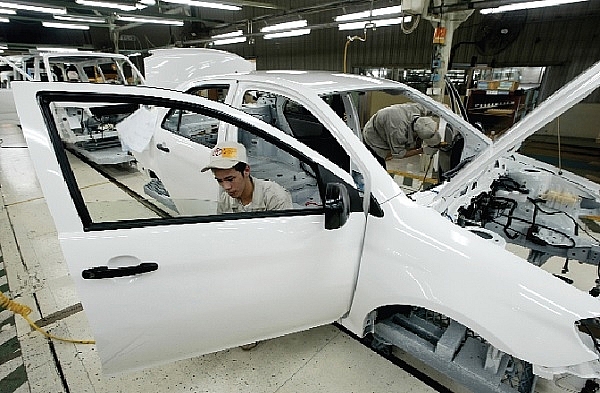Foreign automakers are set for local expansions
 |
| Toyota plans to expand production in Vietnam, Photo: Le Toan |
Mitsubishi Motors has been working on a plan to build another automobile plant in Vietnam, adding to its plant in the southern province of Binh Duong.
“Mitsubishi Motors is seeking to expand local production in Vietnam,” Mitsubishi Motors Vietnam confirmed to VIR last week.
This second plant, with an estimated $250 million in total investment capital, will be designed with an annual capacity of up to 50,000 units, executive vice president of Mitsubishi Motors Corporation Kozo Shiraji told Deputy Prime Minister Vuong Dinh Hue at a meeting in January. The factory is expected to be put into operations in 2020.
Mitsubishi Motors reportedly worked with the central province of Nghe An and the southern province of Long An to find a location for the plant.
Meanwhile, as the top provider and manufacturer in terms of sales in Vietnam, Toyota Motor Vietnam Co., Ltd. (TMV) plans to pour $40 million into raising its capacity from 50,000 units per year to 90,000 units, said Pham Anh Tuan, head of the TMV strategic planning division.
“The investment will be made soon and swiftly, but it depends on sales. If we see good sales, it could reach the capacity of 90,000 units prior to 2023,” he added.
In addition to the extension of welding and painting workshops, car test sites will be upgraded to meet the regulations of Decree No.116 issued by the government last October. The decree prescribes requirements for the import, trade, manufacturing and assembly of automobiles.
TMV is expected to need an additional land area of over 9 hectares and some 300 workers for the expansion. The land area will be transferred to the automaker in October at the latest.
Asked why TMV had only revealed the projected expansion now, Tuan said that TMV proposed amendments to the country’s automobile development policy to the government 10 years ago, in response to the set scenario of completely-built-up (CBU) vehicles imported from ASEAN with a localisation rate reaching at least 40 per cent becoming immune from tariffs starting in 2018.
“At the time, Vietnam had not set forth explicit policies aimed to increase domestic automobile production, so we could not persuade our parent company to go ahead with the expansion of production facilities in Vietnam,” Tuan said.
However, the government’s new, firm stance on fostering domestic automobile production urged TMV to plan the expansion now, Tuan explained.
Another foreign-invested firm, Ford Vietnam, was also seen with the expansion of its production areas. Under a decision issued last November, the Hai Duong provincial People’s Committee approved a report on evaluating the environmental impacts of the project “Ford Vietnam’s automobile manufacturing and assembling plant in Tu Minh ward, city of Hai Duong (governed under the provincial administration)”.
The decision indicates that Ford Vietnam’s plant capacity would rise to 20,800 automobile units per year, almost a 50-per-cent increase against the 14,000 units approved previously.
Meanwhile, a detailed plan of the Ford Vietnam plant ratified by the provincial People’s Committee last September showed that the total land area set for the plant amounts to 300,000sq.m, more than 65,400sq.m of which will be allocated for new facilities.
The detailed plan also includes the expansion of existing welding and assembly facilities and the building of six more, along with the establishment of a new car painting workshop and a car test site. These facilities are allegedly aimed at meeting requirements stipulated in Decree No.116.
Ford Vietnam made no comments on the total investment capital needed for the expansion. The foreign-invested firm specialises in assembling small passenger models like the Eco Sport, Fiesta and Focus, as well as the commercial vehicle Transit. Earlier this year, the company launched the newly assembled crossover Eco Sport after its additional investments in assembly lines and equipment.
Economic expert Ngo Tri Long told VIR that it is not too difficult to make sense of the foreign-invested firms’ moves, as they face pressure from the enforcement of Decree No.116 and the government’s consistent stance on expanding domestic automobile production.
Decree No.116 allegedly created difficulties for automobile imports with its strict testing regulations and procedures set for CBU units, thus extending the time set aside for shipment and delivery and increasing costs, Long, who is former head of the Price and Market Research Institute under the Ministry of Finance, analysed.
He cited the government’s advocacy of domestic production, boosted by Truong Hai Auto Corporation and Vinfast company, as a reason for the foreign-invested manufacturers to go ahead with their plans.
Total automobile sales in the first five months of this year reached over 103,700 units, down by six per cent on-year. Of note, the sales of completely-knocked-down units soared by 10 per cent, while those of CBUs plunged by 46 per cent, according to the Vietnam Automobile Manufacturers Association.
What the stars mean:
★ Poor ★ ★ Promising ★★★ Good ★★★★ Very good ★★★★★ Exceptional
 Tag:
Tag:
Latest News
More News
- Hermes joins Long Thanh cargo terminal development (February 04, 2026 | 15:59)
- SCG enhances production and distribution in Vietnam (February 04, 2026 | 08:00)
- UNIVACCO strengthens Asia expansion with Vietnam facility (February 03, 2026 | 08:00)
- Cai Mep Ha Port project wins approval with $1.95bn investment (February 02, 2026 | 16:17)
- Repositioning Vietnam in Asia’s manufacturing race (February 02, 2026 | 16:00)
- Manufacturing growth remains solid in early 2026 (February 02, 2026 | 15:28)
- Navigating venture capital trends across the continent (February 02, 2026 | 14:00)
- Motivations to achieve high growth (February 02, 2026 | 11:00)
- Capacity and regulations among British areas of expertise in IFCs (February 02, 2026 | 09:09)
- Transition underway in German investment across Vietnam (February 02, 2026 | 08:00)
















 Mobile Version
Mobile Version